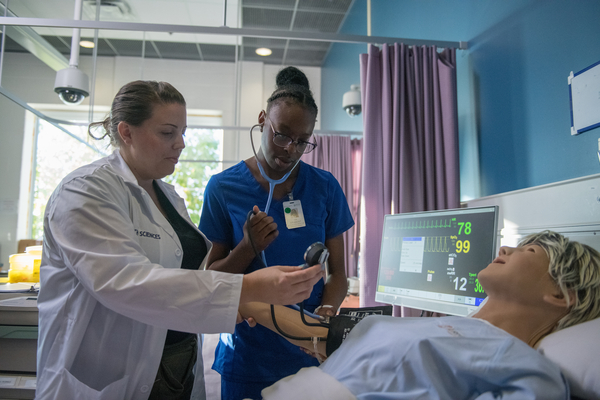Nursing - Collaborative
Overview
 Offered collaboratively with Durham College, our shared team of professors and experts are well-versed at delivering a comprehensive program in our high-tech nursing labs.
Offered collaboratively with Durham College, our shared team of professors and experts are well-versed at delivering a comprehensive program in our high-tech nursing labs.
Our program prepares nurses who are committed to excellence and innovation in assessing and meeting the nursing needs of society. You will learn about
Collaborative learning activities allow you to take an active role in your own learning. In addition, our high- tech nursing labs and simulated learning opportunities provide you with practical, hands-on experience with the latest technology at your fingertips.
Graduates of the program are eligible to write the National Council Examination-Registered Nurse (NCLEX-RN). Individuals must comply with the registration requirements of the College of Nurses of Ontario (CNO).
This program is offered in partnership with Durham College.
My first-year courses, such as Foundations of Nursing I and II, Health Assessment, and Anatomy and Physiology, prepared me for my older-adult placement at Bowmanville Lakeridge Health. These courses laid a strong foundation, covering essential skills and knowledge that every nurse uses daily. For instance, having the knowledge to understand the connection between the cardiovascular and integumentary systems and the importance of turning bedridden patients every two hours is one example of my “textbook to in-practice moments,” which enhances my nursing knowledge and judgment.
Rachel Gonzales Bachelor of Science (Honours) in Nursing, Class of 2026
Admissions
Admissions
Current Ontario secondary school students must complete the Ontario Secondary School Diploma (OSSD) with six 4U or 4M credits, including English (ENG4U) with a minimum 60 per cent, Biology (SBI4U), Chemistry (SCH4U), and one of Advanced Functions (MHF4U), Calculus and Vectors (MCV4U), or Mathematics of Data Management (MDM4U). A minimum of 65 per cent in MHF4U, MCV4U or MDM4U is recommended.
Note: Admission is competitive. The specific average or standing required for admission varies from year to year. Students are selected by taking into consideration a wide range of criteria including school marks, distribution of subjects taken, and performance in subjects relevant to the academic program. Possession of the minimum requirements does not guarantee acceptance. Preference will be given to applicants with the best qualifications.
If an applicant already has an undergraduate degree from a recognized university, quality points can be added to their admission average according to the following:
|
Degree cumulative average |
60 to 69.9 per cent |
70 to 79.9 per cent |
80 per cent or above |
|
Quality points |
3 per cent |
6 per cent |
9 per cent |
Applicants who present an Ontario College Diploma in Practical Nursing (or equivalent) are not eligible to apply to the Collaborative Nursing program.
| Last year's cut-off | Mid- to high 80s |
|---|---|
| Expected cut-off | Mid- to high 80s |
• Ontario secondary school applicants
• Ontario secondary school graduates
• Canadian out-of-province high school applicants
• International applicants
• Mature applicants (over 21 and never attended post-secondary)
• Transfer applicants
• General Arts and Science (GAS) applicants
• Home-schooled applicants
Career opportunities
- Registered nurse
- Health administrator
- Health data analyst
- Health policy analyst
- Graduate studies in Health Science or professional programs (e.g. physiotherapy, occupational therapy, medicine or chiropractic)
Experiential learning
With the Nursing program's strong clinical focus, you have opportunities each year to develop your nursing skills and knowledge in the finest hospitals and agencies in the region through clinical placements.
Clinical placements are a core component in each year of the Nursing program, starting from the first year of studies. Students appreciate and embrace the opportunity to apply their learning in a clinical setting. They are committed to becoming leaders in health-care delivery. They recognize the necessity and importance of working with trained professionals and their patients to enhance their knowledge and further their own skills and professional development.
Did you know?
-
Sample courses
- Loading...
- Loading...
- Loading...
- Loading...
- Loading...
- Loading...
- Loading...
- Loading...
- Loading...
- Loading...
- Loading...
- Loading...
- Loading...
- Loading...
- Loading...
- Loading...
- Loading...
- Loading...
- Loading...
- Loading...
- Loading...
- Loading...
- Loading...
- Loading...
- Loading...
- Loading...
- Loading...
- Loading...
- Loading...
For program requirements, including required number of credits for completion, program maps and course descriptions, please see the academic calendar and course catalogue of Loading.... Courses are subject to change without notice. -
Clinical simulation lab tour




